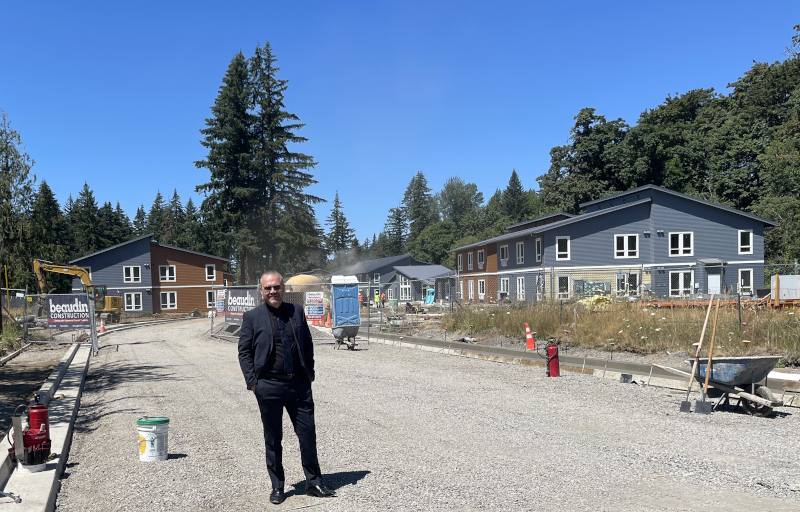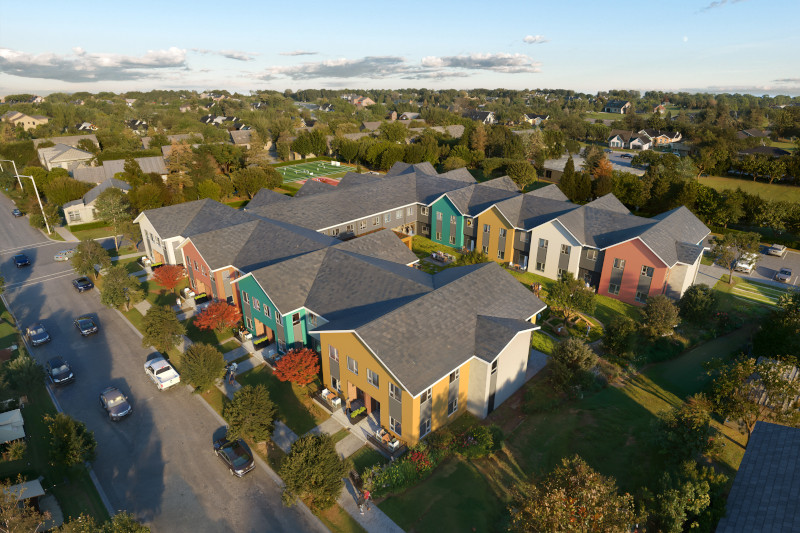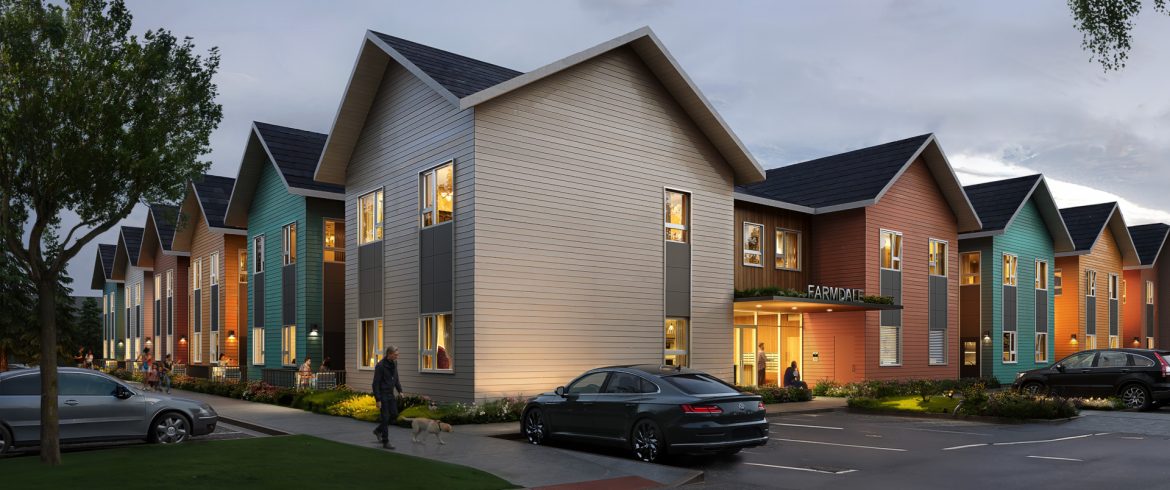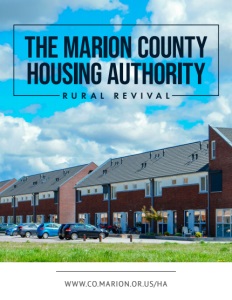Marion County Housing Authority (MCHA)
Rural Revival: Bridging the Housing Gap
Offering affordable and attractive housing solutions for a scenic area always in high demand
While housing stock remains in short supply across the county, another barrier to owning a home remains affordability. In Oregon, a state known for its rugged natural splendor, housing prices are rising northwards and nearly one in four renter households spend more than 50% of their income on rent, highlighting the severity of the affordable housing crisis. The Marion County Housing Authority (MCHA) has taken a leading role in addressing this issue, particularly in the rural areas of Marion County.
As the housing shortage continues to challenge communities nationwide, Executive Director Jason Icenbice and Housing Services Administration (HSA) Manager Christine Sommer of MCHA have been tirelessly working to address the growing demand for affordable housing.
The role of MCHA in Marion County
The MCHA operates as a public housing authority, which, as Icenbice describes, makes it a “public corporation” or, in essence, a government body. “Housing authorities are special that way. I always joke that we’re like the post office or like NASA,” Icenbice remarks, highlighting the unique position of MCHA within the governmental landscape.
MCHA’s primary mission is to provide affordable housing through the HUD-based Housing Choice Voucher program, which accounts for most of the authority’s funding—approximately $11.7 million annually. The program enables low-income residents to rent private market-rate housing by subsidizing the difference between the rent and 30% of the tenant’s income. However, the success of this program has been historically hindered by a shortage of suitable rental housing in the area.

Housing shortages
The housing shortage has reached critical levels nationwide in recent years, and Marion County is no exception. “One of the big challenges has been the shortage of good, decent rental housing,” Icenbice notes. Yet, a glimmer of hope is on the horizon as new market-rate apartment developments alleviate some pressure.
When Sommer started managing the voucher program, the success rate was alarmingly low, with only 27% of voucher holders finding suitable housing. “That success rate now is well over 50%,” Sommer shares with optimism, noting that its goal is to reach a 70% success rate. The increase is a significant improvement and a testament to the efforts of the MCHA team in navigating a tight rental market.
Economic challenges
The pandemic exacerbated the housing crisis, stalling market rates and affordable housing developments. Icenbice explains, “COVID did put our state behind not only in market-rate development but affordable housing development as well.” The challenge is to catch up and continue to meet the growing demand.
One of the largest hurdles in developing affordable housing is securing state and federal funds, which can be long and complex. “To build an affordable housing complex that’s run under one of these programs could take five years to develop, but we’re already behind statewide,” Icenbice states. In spite of these challenges, there are positive developments in the state’s approach to funding affordable housing, with efforts to allocate funds becoming less competitive and more systematic.
Innovating affordable housing
MCHA has been exploring new business models to create affordable housing without relying solely on government funding, which often comes with restrictive conditions. One such model, inspired by the United Way of the Mid-Willamette Valley, focuses on building affordable cottages for seniors in rural areas. The cottages are designed to be cost-effective and subsidized through partnerships with local jurisdictions or land donations.
In Mill City, MCHA is developing 20 one-bedroom cottages for seniors using modular homes built off-site. Icenbice highlights that working with a modular developer could significantly shorten the construction process and reduce costs.
Additionally, MCHA is partnering with private developers to create affordable housing units by leveraging property tax abatements. Collaboration is necessary in rural areas where development can be more challenging due to the lack of infrastructure and higher costs. One such partnership is the development of 54 units in Mill City, specifically for wildfire survivors—a project that would not have been possible without the involvement of MCHA.
Revitalizing farm labor housing
One of MCHA’s oldest properties, the Farmdale Apartments in Woodburn, was originally developed as farm labor housing in the early 1970s. While still functional, these units are small and outdated. Icenbice describes the challenges: “A four-bedroom unit out there is only 900 square feet. We have two-bedroom apartments in our portfolio that are bigger.”
Recognizing the need for modernization, MCHA plans to tear down the existing structures and replace them with a single, two-story building that will house 45 units. This new development will provide more space for families and include one-bedroom apartments to accommodate multi-generational households. “Instead of having eight people crammed into a very small four-bedroom, these floor plans will be much bigger,” Icenbice emphasizes.
The redevelopment of Farmdale will also include the construction of 12 single-family homes on an adjacent acre and a half of land. These homes will be available for purchase by lower-income families, filling a critical gap in the starter home market.

Navigating financing and uncertainty
Financing remains a significant challenge for affordable housing development, particularly given the current state of interest rates. “Probably our biggest financial concern would be the current state of our interest rates,” Icenbice states. Although these challenges persist, Oregon offers programs that assist affordable housing providers by subsidizing interest rates, making projects more feasible.
Supply chain issues have also posed a challenge, particularly with the availability of electrical equipment. However, there are signs that these issues are beginning to ease, with support from state and federal representatives helping to move projects forward. “There were units ready to come online, but you couldn’t hook up the electrical meter so that you couldn’t bring them online,” Icenbice says, highlighting the frustrations faced by housing authorities during the pandemic.
Strengthening workforce
As MCHA continues to grow, so too does its staff. The authority has expanded from a team of 14 or 15 people to 22, with plans to continue this growth. “We’ve been involved with Chemeketa Community College and some of their workforce development programs,” Icenbice shares, stressing the importance of partnerships in building a skilled workforce.
One of the most immediate initiatives is a program to assist students nearing graduation who may be housing unstable. The goal is to stabilize their housing by covering rent or utility payments, ensuring that they can focus on graduating and successfully transitioning into the workforce as planned.
Innovating for the future
Technology is also integral to MCHA’s operations, supporting everything from tenant information management to security measures. The authority has recently enhanced its camera and door security system, transitioning from a manual sign-in process to a more efficient digital system. “Previously, anyone entering could see the names of others who had visited our office on a sign-in sheet. Now, that entire process is digital,” Icenbice explains.
Looking to the future, Icenbice expresses interest in exploring the potential of artificial intelligence to streamline processes for participants. ‘Imagine a computer having a conversation with someone in need of our service and, through that interaction, completing their application,” Icenbice muses. While AI still has a long way to go, the possibilities are intriguing and could revolutionize housing authorities’ operations.
The road ahead
As MCHA plans, several key priorities are on the horizon. The redevelopment of Farmdale is a top priority, with plans to break ground in early 2026. In the meantime, the authority will continue to focus on improving the success rate of its voucher program and making it easier for residents to access affordable housing.
“Eighteen months from now, our focus will be on ensuring that those who need to access our programs find it increasingly easier to do so and navigate through them,” emphasizes Icenbice.
In a time when affordable housing is more vital than ever, the work being done by the Marion County Housing Authority is not just necessary—it’s transformative. Through innovative business models, strategic partnerships, and a deep commitment to serving their community, Icenbice, Sommer, and the entire MCHA team are impacting the lives of Marion County residents, addressing urgent needs, and paving the way for a more stable and equitable future.
AT A GLANCE
Marion County Housing Authority (MCHA)
What: A public agency that provides affordable housing and related services to low-income individuals and families in Marion County, Oregon.
Where: Marion County, Oregon
Website: https://www.co.marion.or.us/HA



